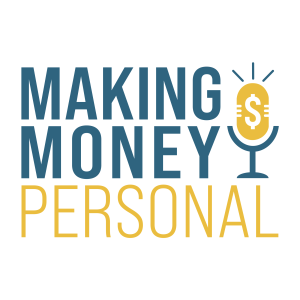Episodes

Thursday Mar 21, 2024
Episode 67: Strategies to Improve Financial Communication as a Couple
Thursday Mar 21, 2024
Thursday Mar 21, 2024
Arguments are common in relationships, especially when it comes to finances. If you're tired of bickering about money with your spouse or partner, then keep listening.
In this episode, we discuss a few reasons why couples often fight over money, and we'll share some specific ways you can work together to reach common financial ground.
Links:
Check out any upcoming webinars for budgeting and debt reduction strategies or watch on demand on our YouTube playlist
Check out TCU University for more financial education tips and resources!
Follow us on Facebook, Instagram and Twitter!
Learn more about Triangle Credit Union

Tuesday Mar 19, 2024
Check Your Financial Health with an Assessment - Money Tip Tuesday
Tuesday Mar 19, 2024
Tuesday Mar 19, 2024
How satisfied are you with your overall financial health? When was the last time you even checked it? If you’re not sure where you stand financially, assessing your existing financial situation is an important place to start.
Stay tuned to learn more about the steps you can take to improve your financial health and wealth.
Links:
Triangle's Financial Assessment tool
Check out our Budgeting 101 webinar
Check out TCU University for more financial education tips and resources!
Follow us on Facebook, Instagram and Twitter!
Learn more about Triangle Credit Union
Transcript:
This is Money Tip Tuesday from the Making Money Personal podcast.
According to research with online financial experts, the beginning of a new year is the perfect time to assess your financial health and future. Many people recommend doing an assessment right at the beginning of the year because it’s a pivotal time to start fresh. But if you feel a bit behind because you haven’t done it yet, the good news is that there is no bad time to do a financial assessment.
So, where should someone start with a financial assessment? Here are a few steps to take to get started.
The first step in a full financial assessment is your monthly spending. Does your income meet or exceed your expenses? How will know if you don’t do a budget! To learn more about budgeting, we encourage you to check out our YouTube channel for our Budgeting 101 webinar. This webinar provides all the information you’ll need to start a budget, including a dynamic Excel spreadsheet that is easy to navigate and fun to use.
Second, we recommend looking at your income. How much did you earn last year? Is your salary in line with and competitive with similar jobs in your area? If not, a candid conversation with your employer may be in order. As you prepare for this discussion, make sure you do your research and provide collaborating documentation for your presentation. While this type of meeting may be uncomfortable for you and your employer, more employees are sharing their concerns and salary information—not to be negative, but to stay competitive.
Third, make sure your financial checkup includes a credit check. You can access your credit report for free through annualcreditreport.com. Examine your report closely to ensure there are no discrepancies, especially credit card balances. Identity theft often starts with credit card fraud, so your close examination can guard against fraudulent activity.
Last, assess your financial progress with savings goals, wealth-building investments, and retirement. Triangle offers a variety of financial planning tools including a new financial wellness assessment tool that provides an immediate snapshot of your shortcomings and recommend steps to improve them. This assessment takes less than 5 minutes, but the outcome is worth it! Check it out at trianglecu.org.
A solid financial position is essential for a healthy and secure future. An annual assessment can help you make intelligent decisions about your financial health today and prepare you for a wealthy tomorrow.
If there are any other tips or topics, you’d like us to cover, let us know at tcupodcast@trianglecu.org. Like and follow our Making Money Personal FB and IG page and look for our sponsor, Triangle Credit Union on social media to share your thoughts.
Thanks for listening to today’s Money Tip Tuesday and be sure to check out our other tips and episodes on the Making Money Personal podcast.
Have a great day!

Tuesday Mar 12, 2024
Simple Ways to Save on Healthcare Costs - Money Tip Tuesday
Tuesday Mar 12, 2024
Tuesday Mar 12, 2024
Being healthy should always be a priority, and taking care of yourself is very important. However, things happen, and you may become sick or injure yourself.
Healthcare, which many need, can often be expensive and even unaffordable to some. Here are some ways to save on healthcare.
Links:
Check out TCU University for more financial education tips and resources!
Follow us on Facebook, Instagram and Twitter!
Learn more about Triangle Credit Union
Transcript:
Welcome to Money Tip Tuesday from the Making Money Personal podcast.
If you’re looking for ways to save on healthcare, we have tips for you!
First, choose a healthcare plan that works for you. Low-deductible plans have higher monthly premiums but will cover more of your health costs. This plan suits those with health issues who need regular care. High-deductible plans have lower monthly premiums, but you must pay more out of pocket. This plan is suitable for those who rarely need medical care. If you have a high-deductible healthcare plan, you should enroll in a Health Savings Account, or HSA for short. HSAs are great for saving money for medical expenses, medical bills, and higher deductibles and any money you contribute to an HSA are tax deductible, or if made through payroll deductions, are pretax which lowers your overall taxable income. Ans your funds grow tax free in the HSA. When you need to make a withdrawal, if it is used to pay for a medical or dental expense (as dictated by IRS rules), you will not pay taxes on that money.
The HSA limit for 2024 is $4,150 for individuals, and families can contribute up to $8,300.
HSA is a great way to reduce your tax base and it covers expenses in your high deductible health plan. For example, our medical plan has a $2,500 individual deductible annually. Rather than paying a high premium, I personally would rather put the money I pay in premium into an HSA and use a high deductible plan.
Second, check your past usage of your healthcare plan. If you are using it sparingly, you're most likely over-insured. If you're paying more out of pocket, you're underinsured. If you have medical insurance through your employer, check with your HR or Benefits Administration Department – they should be able to offer some advice in this area.
Third, if possible, only go to healthcare providers covered by your health coverage. Choosing healthcare providers who are in-network is cheaper than selecting those who aren't in-network. This is because in-network providers have a contract with your health plan and can charge you lower rates.
Fourth, if you take medications, there are a few ways to save money on your next prescription. If you're taking a name-brand drug, ask your healthcare provider if you can switch to a generic. Generic drugs should have the same ingredients but at a lesser cost. You can also ask your healthcare provider if a less expensive medication can treat you.
Fifth, if you have a procedure, ask your healthcare provider if you can do it at an outpatient surgical center rather than a hospital. Outpatient clinics are typically 45 to 60 percent less expensive than a hospital. This is because outpatients are smaller businesses with less overhead and are generally cheaper to run. Also, you typically won't be spending the night and will only be there for the day, substantially cutting the cost of being in a hospital.
Lastly, participate in preventative care. Eating well and exercising will make you healthier and less likely to become ill. If you are sick, the doctor will likely catch it before it becomes too severe.
If there are any other tips or topics you'd like us to cover, let us know at tcupodcast@trianglecu.org. Also, remember to like and follow our Making Money Personal Facebook and Instagram to share your thoughts. Finally, remember to look for our sponsor, Triangle Credit Union, on Facebook and LinkedIn.
Thanks for listening to today's Money Tip Tuesday. Be sure to check out our other tips and episodes on the Making Money Personal podcast.
Have a great day!

Tuesday Mar 05, 2024
How to Know it’s Time to Buy a New Car – Money Tip Tuesday
Tuesday Mar 05, 2024
Tuesday Mar 05, 2024
How do you know it’s the right time to buy a new car? Are there signs to recognize the need for an upgrade or replacement? If you’re on the fence about whether to start looking for a new car, there are a few things to consider first before jumping into the process.
Links:
View the Consumer Reports article for more information
Check your car’s value with Kelley Blue Book
Check out TCU University for more financial education tips and resources!
Follow us on Facebook, Instagram and Twitter!
Learn more about Triangle Credit Union
Transcript:
Welcome to Money Tip Tuesday from the Making Money Personal podcast.
To buy or not to buy. That is the question.
Most of us have a car. We use our cars every day. For many people, it seems they’re getting a new car every other year. But for others, determining the right time to replace an existing car can be challenging. Have you been mulling over it for a while or rather lured into it by that recent commercial for a brand-new luxury model?
If we want to make the right decision when it comes to buying a new car, it’s important to make sure we’re making it from a reasonable perspective rather than an emotional perspective.
How do you know it’s time? What are some of the signs you’re ready for a trade in? According to an article by Consumer Reports, there are a few reasons why someone might start their search for a new car. These are: you want to save money, you’re concerned about safety, or you want more features in general.
We’ll start with the first one, Saving money:
Cars always cost something to run. You’ll pay for fuel, maintenance, repairs and insurance – the list can keep going. Is your car getting too expensive for you? Are you dishing out hundreds or thousands of dollars for repairs every year? This might be the time to consider trading it in.
But is paying the price of a new car worth trading in the existing one? The sticker price of a car is in the tens of thousands where repairs could be in the hundreds, maybe thousands. Do the math, compare your car’s value by checking Kelley Blue book .com and compare that with the amount of money you’ve been spending in repairs.
If the value of the car is less than the amount of money it’ll cost to repair, then it’s most likely time for a trade in. If the car is only in need of low-level repairs or maintenance that doesn’t cost too much or you could even do yourself, then it may be wise to keep it around for a few more years.
The second one to address is if there are concerns about safety.
If the car can’t get you reliably from point A to point B then it’s time to start looking for a new one. But even if an older model is still reliable, it’s also important to review the quality of the safety features of that car.
Newer models have upgraded safety features like blind spot alerts, backup cameras, refined airbag technology, frame design, and braking systems with improved capabilities to keep passengers safe. Older models lacking those designs might not be as trustworthy in accidents or situations.
Consider the safety of your existing vehicle to determine whether it’s still meeting all the safety needs of your family. If safety is important to you, then upgrading to a newer car may give you better peace of mind because you’ll know your car is equipped to protect everyone traveling in it.
The third reason you may consider a new car is just for more features in general:
Older vehicles provided many things that seemed cutting edge back in the day but have now pretty much gone obsolete. Today, there may still be an occasional car with crank windows, a cassette player and even an ash tray.
But many of today’s drivers have no need for those features and are now interested in other things like new GPS capabilities, voice commands, built-in navigation, and other automatic features. As new models roll out, manufacturers are adding newer and more sophisticated technology to improve the driving experience.
If you like the idea of heated seats because you’re driving to work at 3:30 am on a snowy morning, a newer vehicle will have just what you need. Some people are okay driving with older features and foregoing the new tech for a bit to save some money, but if after a while you find you’re in need of some more improved tech, then it may be time to trade in.
To wrap up, determining why you want a new car in the first place helps provide better insight into whether it’s the right time to start the process or to wait for a little bit.
If you have made the decision to find a new car, or a new to you car, we’ve got you covered. Check out our competitive rates and get preapproved at trianglecu.org to head confidently to the dealer when you’re ready to buy.
If there are any other tips or topics you would like us to cover, let us know at tcupodcast@trianglecu.org. Like and follow our Making Money Personal FB and IG page and look for our sponsor, Triangle Credit Union on social media to share your thoughts.
Thanks for listening to today’s Money Tip Tuesday and be sure to check out our other tips and episodes on the Making Money Personal podcast.
Have a great day!

Tuesday Feb 27, 2024
Tips to Keeping Connected Devices Secure - Money Tip Tuesday
Tuesday Feb 27, 2024
Tuesday Feb 27, 2024
Identity theft can be expensive. It costs you not only time to fix, but money and resources too. When it comes to keeping your information secure, even the newest technology still has weaknesses, and it’s up to you to stay aware of what those weaknesses are.
Links:
Learn more about KnowBe4 Security Awareness
Protect your identity with Triangle's Better Checking account with IDProtect
Check out TCU University for more financial education tips and resources!
Follow us on Facebook, Instagram and Twitter!
Learn more about Triangle Credit Union
Transcript:
Welcome to Money Tip Tuesday from the Making Money Personal podcast.
This tip comes from an article provided by KnowBe4 Security Awareness and training.
We’re going to explore the future of connected devices, how these devices may impact cybersecurity, and what you can do to stay safe.
New innovations in technology are being developed at a rapid rate. But new technology comes with new risks. Let's go over some examples of how technology will change in the future and ways you can stay safe.
5G Cellular Networks
You may think a cellular network is only used for cell phones, but it can also be used for GPS devices, wifi hotspots, logistics tracking, and more. 5G stands for the fifth generation of cellular networking. In short, 5G is a dramatically faster and more stable way to connect to the internet.
While this is great for connectivity, it could be a major struggle for cybersecurity. Current security monitoring methods may not be strong enough for the speed and amount of traffic created on a 5G network.
The Internet of Things
The Internet of Things, or IoT, is a network of connected devices designed to work together using an internet connection. A common example of this is the use of “smart” devices in the home. Smart devices connect and communicate with one another using your wifi network. IoT is being used and developed across a number of industries, from healthcare to logistics.
Each device within an IoT network is a potential risk. As more devices are connected to one another, an organization’s attack surface grows. Meaning, there are more targets for cybercriminals to attack and more points of entry to protect. As these networks grow, it is essential that cybersecurity measures grow with them.
Safety Tips for Now and Later
Stay Informed
No matter what the future holds, it is always harder to fool an educated person. Follow trusted news and media outlets for the latest updates in technology and cybersecurity.
Be Suspicious
As technology changes, cybercriminals will find new ways to attack. If something doesn’t look or feel right, report it. It is better to be safe than sorry!
Time Travel to the Past
Maybe technology isn’t quite there yet, but you can use classic communication to outsmart cybercriminals. For example, if you receive a suspicious email, reach out to the sender by phone to verify that it’s legitimate.
If there are any other tips or topics you would like us to cover, let us know at tcupodcast@trianglecu.org. Like and follow our Making Money Personal FB and IG page and look for our sponsor, Triangle Credit Union on social media to share your thoughts.
Thanks for listening to today’s Money Tip Tuesday and be sure to check out our other tips and episodes on the Making Money Personal podcast.
Have a great day!

Tuesday Feb 20, 2024
Try This Five Point Debt Payoff Plan - Money Tip Tuesday
Tuesday Feb 20, 2024
Tuesday Feb 20, 2024
Debt is a familiar burden most Americans face daily. Whether the debts are small or large, many are becoming fed up and joining a movement to pay off debt and reach financial freedom.
If you’re one of those looking for a way out of debt, it’s time to put together a debt payoff strategy to set you up for success.
Links:
Get your budgeting tools on our TCU University resources page
Watch our pre-recorded financial freedom webinar for a more in-depth explanation of this debt payoff plan
Check out our upcoming events for new webinars and workshops
Check out TCU University for more financial education tips and resources!
Follow us on Facebook, Instagram and Twitter!
Learn more about Triangle Credit Union
Transcript:
Welcome to Money Tip Tuesday from the Making Money Personal podcast.
Getting out of debt can be overwhelming. Staring at a large number, wondering how in the world you’ll be able to pay it off, is enough to make anyone want to give up and say, “Never mind.”
But debt and the burden it brings does not have to haunt you forever.
With a simple, five-point plan, you can tackle that debt burden and finally get onto a path that will eliminate it forever. This plan breaks the debt payoff journey down into manageable, actionable steps to stay on track to meeting your goal.
Step one: Acknowledging you have a problem
Debt is no different than any other personal challenge we face. Once we determine the problem affecting us, then we get the resolve to do something about it. Is your debt affecting your mood? Your relationships? Your health? If you answered yes to any of these questions, it’s a burden in your life that has to go. Be honest about where you are now and where you want to be.
Acknowledge all your debts. Then list them all from credit cards, personal loans, student loans, medical bills, car payments, everything. With it all out front and visible, it’ll be easier to assess how much work you’ll need to put in to pay it off. With the debt problem illuminated, it’s time to move to the next step.
Step two: Resolve to do something about it
This step is where you take ownership. You’ve admitted you have a debt problem, and now it’s time to do something about it.
This step involves finding all the information needed for a proper strategy. Seek out resources that provide education and insight into solving your problem. If that’s a trustworthy friend or professional, a webinar, online course, book, or even blog, take that first step of resolving to commit to this journey.
Step three: Create your plan
This step is all about laying out the strategy you’ll follow, and the very first step in this plan is to create a budget. Know your income and expenses and put them all onto a budget sheet. This process organizes your money into categories so you can see all the money coming in and going out. If you need access to a budget sheet, we’ll link to one in the show notes you can download and use.
Within the budget process, determine to put any extra income towards debt. That means you'll need to pause additional spending on fun and other frivolous things for some time. Put all your remaining money towards that debt pile to reach that debt-free goal sooner.
It’s also essential to choose the order in which you’ll pay your debts off. Many people use one of two popular debt payoff structures for this – the debt avalanche or debt snowball.
The debt avalanche method involves paying off the highest-interest debt first, eventually working down to the lowest-interest debt. The debt snowball consists of tackling the debt with the smallest balance and then working up to paying off the largest balance.
The principles of both plans are the same. Tackle one debt with any extra money while paying the minimum balance on other debts. Once one debt is paid, use that money that you had been paying to pay off debt to the next one—keep doing this same process until all debts are paid off.
Step four: Execute your plan
This step is where the rubber meets the road. It’s time to act upon everything in the plan. Find a trusted person to hold you accountable throughout this process. If you decide to stop using credit cards, this is where you’ll cut them up. Establish your target date to be debt-free. Do you want to be out of debt in a year? Maybe two? This number will differ for everyone depending on the amount of debt and their net income.
If you’re looking to work an extra job or hours, this is the time to start. Start working out your debt reduction plan, whether the debt avalanche or the debt snowball method.
Step five: monitor your results and repeat
This step is the only way to determine if your plan is working. Keep an eye on it and monitor it regularly to stay on top of it.
Print out your sheet or save it somewhere you’ll see it daily. Putting it on a poster is a super effective way to keep it top of mind. Tape it to a bathroom mirror, bedroom mirror, or fridge to keep it visible.
The key is remembering it. You want it to be a daily reminder of the goal you set for yourself.
Check-in on your progress regularly. Weekly, monthly, however frequently you think is best.
With these five steps, you can tackle almost any challenge, debt being one of them.
If you’d like to dive deeper into these steps, check out Triangle’s Paying off Debt webinars, which are available to join live throughout the year or watch them on-demand on our YouTube channel.
If there are any other tips or topics you’d like us to cover, let us know at tcupodcast@trianglecu.org. Like and follow our Making Money Personal FB and IG page, and look for our sponsor, Triangle Credit Union, on social media to share your thoughts.
Thanks for listening to today’s Money Tip Tuesday. Check out our other tips and episodes on the Making Money Personal podcast.
Have a great day!

Thursday Feb 15, 2024
Episode 66: Support a Local Nonprofit with Share 'Cuz You Care
Thursday Feb 15, 2024
Thursday Feb 15, 2024
Caring for our community has been part of Triangle's DNA since we incorporated 85 years ago. Community means so much that we added it as one of our core values.
Through volunteerism, donations and sponsorships, Triangle supports over 50 charitable organizations that help our communities for those who need a helping hand. Stay tuned to hear from local charities, how they help others, and how you can help with a simple vote in our Share 'Cuz You Care campaign.
Links:
Learn more about the three organizations featured in the episode:
Harbor Care, Nashua, NH
The Upper Room, Derry, NH
Webster House, Manchester, NH
Visit our Share 'Cuz You Care campaign page to vote DAILY for the nonprofit you'd like to see win the top donation of $1,000 from Triangle Credit Union.
Learn about Triangle's financial planning resources
Check out other financial resources and blogs at TCU University
View episode transcript.

Tuesday Feb 13, 2024
Financial Topics Couples Should Discuss - Money Tip Tuesday
Tuesday Feb 13, 2024
Tuesday Feb 13, 2024
How often do you talk with your spouse or partner about money? Are you even on the same page when it comes to finances? The truth is, if you’re married or in a serious relationship there are some important financial topics you should discuss.
Links:
For budgeting resources check out:
You Need a Budget (YNAB)
Ramsey Solutions
Triangle Credit Union webinars
Learn about Triangle's financial planning resources
Check out other financial resources and blogs at TCU University
Transcript:
Welcome to Money Tip Tuesday from the Making Money Personal podcast.
If you’re in a relationship, there’s a good many things you need to work together on, and finances aren’t any different.
For some people finances are that sort of thing that most don’t want to discuss at all. I mean, it can turn a civilized conversation into a knockout drag out fight.
But, the reality is that some of these topics should be talked about, and for many people, sooner rather than later.
Here are six financial topics couples should discuss:
The first topic couples should discuss is budgeting.
For most couples, particularly married couples, this is a must. The purpose of this is to work together to determine how much you make and where it’s all going every month.
If you’re new to this, get started by watching some videos, attending a webinar, or reading some books. Then, armed with the knowledge of how to properly set up a budget system, take some time, sit down and do your budget. Make it a date. Try ordering takeout or cook a special meal to make it feel more of a fun event rather than a chore.
If you need some help, check out resources like You Need A Budget (YNAB), Ramsey Solutions, and Triangle Credit Union webinars, available to watch on YouTube.
The next topic couples need to discuss is savings and retirement.
Like the last one, this one also applies more to married couples, but for single people however, it might not be a bad idea to get an idea of where your partner stands when it comes to spending. It’ll give you a peek into how compatible you two really are.
When discussing spending, ask each other what you’re saving for, both as a couple and as individuals. Determine whether you have an emergency savings account and how much you’ll need to fully fund it. Having a proper savings plan ensures that your financial future will be secure.
Are you both planning to retire and when? Make sure you’re discussing retirement goals and how working to reach those goals affects your savings rate now. If you’re going to build your financial future together, you need to give it the best foundation possible by having a healthy emergency fund, good savings habits and a well-planned retirement strategy.
The third thing to discuss is goals.
If you have wishes and goals, your partner likely does too. You need to talk about what those goals are and how they affect your finances in both the near future and distant future.
Start with short term goals. As a couple, do you want to save for a downpayment? How about paying off a credit card? Or perhaps paying down a set portion of your student loans?
When it comes to long term goals, look a little farther out. Depending on where you are in life, do you want to finally own a home? Get completely debt free? Maybe buy a second home? Plan a once in a lifetime vacation?
The best way to achieve goals is by determining where you want to be or what you want to achieve as a couple, laying out the steps you’ll need to get there and work hard and keep focus to meet that goal at its appointed time. Set up a timeline, determine milestones and remember to celebrate once your goal is reached.
The fourth topic to discuss is whether you’ll have separate or joint bank accounts.
If you’re not married, then keeping accounts separate is the better plan.
If you’re married, the typical choice is to combine finances. Though there are many cases where husbands and wives continue to manage their own money, in many ways combining finances and accounts forces you to make the financial decisions together as one household rather than two separate individuals with their own goals.
If you are married and choose to keep your accounts separate, that can work too. Just make sure that you’re both fiscally mature and communicate about everything. Keeping an open conversation about spending, saving and the like will keep the stress down and ensure you’re both still on the same page.
The fifth topic is to discuss what you’ll teach your children when it comes to money.
If you have kids, or plan to have them one day, talk about what you’re going to teach them when it comes to money. Will they have chores? Get an allowance? How much?
Will you teach them how to budget? How old do you think they should be when they get their first job?
You and your spouse should discuss all these questions so you’re both on the same page when it comes to raising your kids in a financially responsible way.
The sixth topic to talk about is Insurance.
For couples, this is definitely not the most exciting topic at all, but it’s important to have this discussion. Because there are so many different types of insurance coverage for a variety of things from houses and cars to pets and identity, you need to talk about which ones would benefit you most as a couple and household.
Insurance costs money, so just because your spouse thinks you need that special coverage doesn’t mean it’s best for you both to dish out the extra money each month. Have a discussion to decide on the most beneficial types of insurance for your lifestyle and select the plans that you can reasonably afford.
If you’re not sure where to start when it comes to insurance, meet with a financial planner who can steer you into the right insurance plans with the proper coverage and premiums for your current financial situation. They’ll also help reassess any existing plans and provide alternate options to keep up with the many changes that can occur in life.
That’s it for this tip with six financial topics couples should discuss.
If there are any other tips or topics, you’d like us to cover, let us know at tcupodcast@trianglecu.org. Like and follow our Making Money Personal FB and IG page and look for our sponsor, Triangle Credit Union on social media to share your thoughts.
Thanks for listening to today’s Money Tip Tuesday and be sure to check out our other tips and episodes on the Making Money Personal podcast.
Have a great day!

Tuesday Feb 06, 2024
Follow This Simple Money Rule to Start Building Wealth - Money Tip Tuesday
Tuesday Feb 06, 2024
Tuesday Feb 06, 2024
Building wealth might seem complicated and hard to master, but there’s one financial habit when done effectively, that can put you on a path to building wealth in no time. In this tip, I’m going to share one simple money rule that changed the way I view my paycheck forever.
Links:
The Richest Man in Babylon by George S. Clason
Get your dollars earning more for you with CDs, IRAs and Online Savings
Learn how Triangle's financial professionals can help you set up an investing plan that will build wealth!
Check out TCU University for more financial education tips and resources!
Follow us on Facebook, Instagram and Twitter!
Learn more about Triangle Credit Union
Welcome to Money Tip Tuesday from the Making Money Personal podcast.
When it comes to building wealth, it’s easy to get discouraged when after years we don’t seem to be any farther along than when we first started.
We then jump to conclusions about ourselves with thoughts like, “I don’t make enough”, “I can’t afford to save”, or “I don’t have enough time”.
But surprisingly, building wealth has less to do with how much money you make and has more to do with how much you save.
If you want to be wealthy, if you want to amass a fortune, I’m going to share a brief segment from a little parable you may have never heard before. It comes from the book, “The Richest Man in Babylon” by George S. Clason.
This book was first published in 1926 and it shares important financial principles in the form of parables set during the time of ancient Babylon.
The first parable addresses how your perspective on the money you make and how you choose to use it determines whether you’ll grow wealthy.
Here goes:
Arkad, known to be the richest man in Babylon, started as a humble scribe and now as an older man, owns a legendary fortune that rivaled even the very king.
In the parable, Arkad speaks with a young man who wants to know the secret to building a fortune.
Arkad responded by simply saying, “I found the road to wealth when I decided that a part of all I earned was mine to keep.”
The young man was a bit confused at the short reply and responded, “Is that all? But all I earn is mine to keep.”
Arkad replied, “Far from it. Do you not pay the garment maker? Do you not pay the sandal-maker? Do you not pay for the things you eat?... What have you to show for your earnings of the past month?... You pay to everyone but yourself. You labor for others.”
This first exchange illuminates the reality that much of the money we earn is spent. Much of it goes to bills and necessities as well as other things we desire or want to experience.
Arkad’s first point is important because we need to recognize that when we’re spending money, we’re paying other people and that money isn’t ours to keep.
So what does that leave for us? How can we build wealth if we don’t have any money to build wealth with?
At this point, Arkad continues the lesson by saying, “Every gold piece you save is a slave to work for you. Every copper it earns is its child that also can earn for you. If you would become wealthy, then what you save must earn, and its children must earn...”
Arkad sums his lesson up with this simple message.
“A part of all you earn is yours to keep.... Pay yourself first.”
Arkad’s simple, yet profound advice, though fictional, is a simple strategy to building wealth over time.
When we spend everything we make, we’re contributing to making others rich rather than building our own wealth. We’re paying everyone but ourselves.
Faithfully set aside a portion of your income for yourself every time you get paid.
Then, find a way to get that money to make more money. Use savings accounts like online savings, CDs, IRAs with good interest rates and talk to a financial professional to set up quality investment accounts that will get those dollars earning more in the background.
Before closing I’ll leave this final message from Arkad. He says, “Wealth like a tree, grows from a tiny seed. The first copper you save is the seed from which your tree of wealth shall grow. The sooner you plant that seed the sooner shall the tree grow. And the more faithfully you nourish and water that tree with consistent savings, the sooner may you bask in the contentment beneath its shade.”
If there are any other tips or topics, you’d like us to cover, let us know at tcupodcast@trianglecu.org. Like and follow our Making Money Personal FB and IG page and look for our sponsor, Triangle Credit Union on social media to share your thoughts.
Thanks for listening to today’s Money Tip Tuesday and be sure to check out our other tips and episodes on the Making Money Personal podcast.
Have a great day!

Tuesday Jan 30, 2024
Maximize February Car Deals with a Pre-Approval - Money Tip Tuesday
Tuesday Jan 30, 2024
Tuesday Jan 30, 2024
Hunting for a new car doesn’t have to be a hassle. It should be fun and enjoyable. Fortunately, this time of year is a good time to find that perfect car and, with a little advanced planning, score a fantastic deal and a great rate.
Links:
View auto rates, get pre-approved, and start your search with our AutoSmart tool.
Check out TCU University for more financial education tips and resources!
Follow us on Facebook, Instagram and Twitter!
Learn more about Triangle Credit Union
Transcript:
Welcome to Money Tip Tuesday from the Making Money Personal podcast.
If you’re in the market for a car, you’ll have a lot of decisions to make. You’re probably hunting through car listings or scoping out nearby dealerships to pop by and maybe take a few cars for a test drive.
But did you know that the process of buying a car starts before you even sit in that driver’s seat?
If you’re ready to take advantage of the upcoming car deals this time of year, you’ll want to take certain steps to make sure you get a great price.
First, establish your budget then go ahead and shop the prices. - Determine your budget by crunching numbers to find an affordable price. Use some online payment calculators to get an idea of how much your monthly payment will be. With your ideal price in mind, start scoping around for good deals.
This time of year, President’s Day is a spectacular deal day, particularly for car buying. It’s usually the first deal weekend of the year for most car sellers so they’re going to be extra eager to share attractive pricing on not only new models but also on popular cars you’ve been dreaming to own.
Before you visit the dealer, scope out the car or cars you’re interested in a few weeks before President’s Day so you can keep an eye on pricing and take advantage of any deals that pop up over President’s Day weekend. Remember to keep that budget in mind.
Second, make sure you know your credit score and check your report. Prepping your credit is an ideal way to set yourself up for getting a great price for the car you want. Your credit eligibility is an important factor to getting the most from these special deals because it largely determines how much you’ll get approved for and at how low a rate.
Review your credit score and report. If you’re not happy with what you see, start taking steps to fix it. Make sure you make all your payments on time and keep any balances well under your credit limits. Doing this will help demonstrate that you’re responsible with your credit and will likely score you a lower rate.
The final thing to getting the car you want at a great price is to get pre-approved BEFORE you head to the dealer.
Whatever your reasons for buying a car, whether it’s your first ride, or you’re ready for an upgrade, if you’re planning to take out a loan for your vehicle, you’ll want to be prepared with the financing that is best for your budget and you do this by pre-qualifying for the loan.
Prequalifying tells the dealer that you’re already set up with financing. It will help you shop with confidence because you already know the amount you’ve been approved for. That confidence also comes in handy when you negotiate pricing with the dealer, because your budget remains fixed due to the pre-approval.
Pre-qualifying can also move the process along much faster because it cuts down on your time spent at the dealership. Once you decide on the vehicle you want, you simply return to the credit union and get your check to complete the purchase.
If you’re wondering how to get pre-approved, it’s pretty straightforward.
You can get started online or stop by your local branch. Once you’re in the system, a representative will get in touch with you to work through the next steps.
Once your preapproval is established, it’s time to shop. When visiting the dealers, inform them that you already have a pre-approval with your credit union. When you’ve selected your vehicle, you’ll then bring the purchase and sales agreement from the dealership back to the credit union to finalize the process.
If there are any other tips or topics you would like us to cover, let us know at tcupodcast@trianglecu.org. Like and follow our Making Money Personal FB and IG page and look for our sponsor, Triangle Credit Union on social media to share your thoughts.
Thanks for listening to today’s Money Tip Tuesday and be sure to check out our other tips and episodes on the Making Money Personal podcast.
Have a great day!

Financial Lessons & Tips
Join us for fun, relevant financial topics that provide you with resources to help you make financial decisions. The Making Money Personal Podcast talks about the impact that money has on your personal and professional life. Our podcast examines trends and topics with support from industry professionals.





